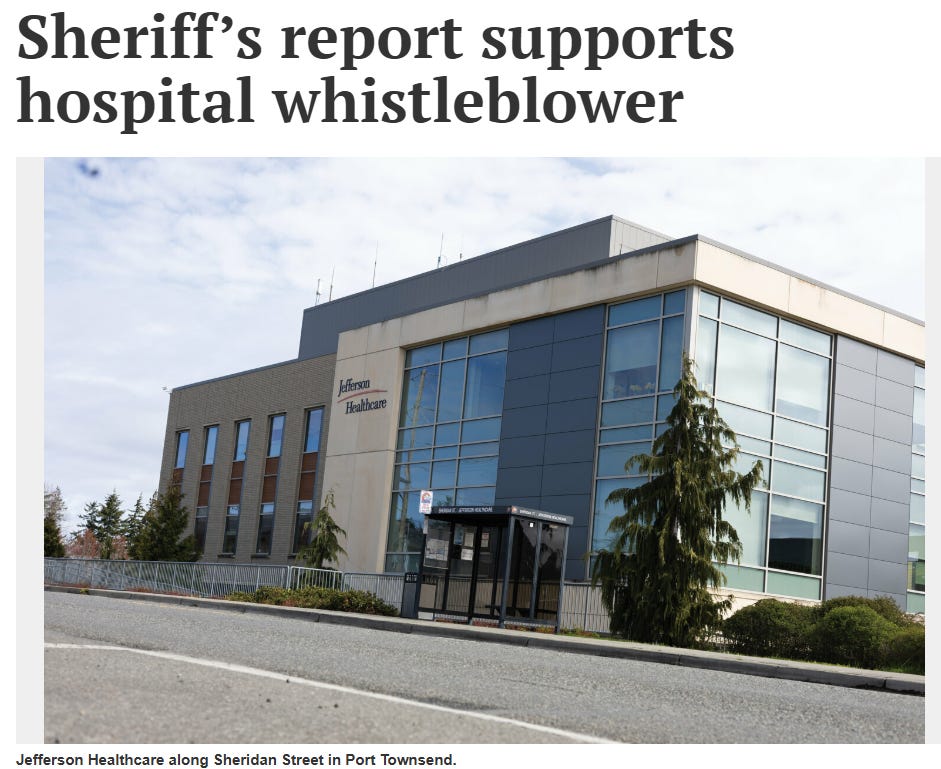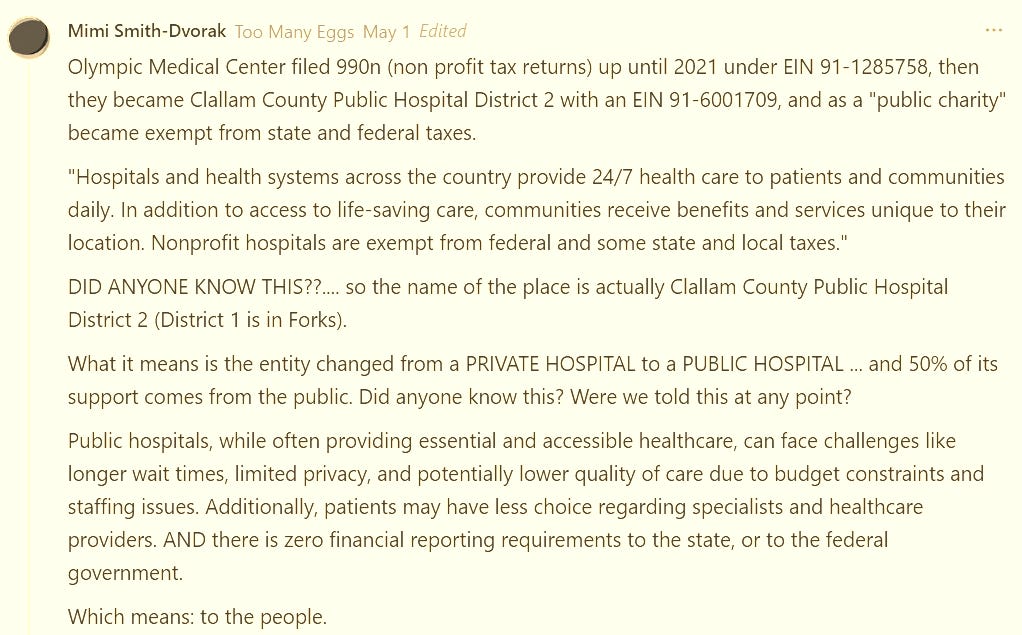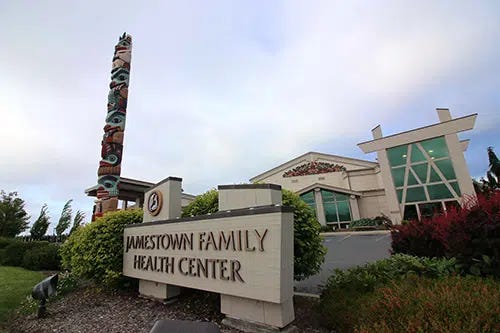Voters stepped up to save Olympic Medical Center with a tax hike—but now the hospital is shutting out the public, hiding its finances, and quietly planning a merger behind closed doors. What happened to accountability? And who really benefits if OMC goes under? Follow the money, follow the secrecy, and follow the growing pattern of public institutions treating taxpayers like blank checks.
This time last year, Olympic Medical Center (OMC) warned Clallam County voters that without a levy lid lift, the region risked losing 24/7 labor and delivery, emergency and trauma care, ICU services, and obstetrics. The threat worked: voters approved a measure that doubles the property tax rate used to fund the hospital.
But almost as soon as the votes were counted, transparency dried up.
“We’re local and accountable to Clallam County, and levy support helps us provide the essential health care services our community needs…” — OMC CEO Darryl Wolfe in a plea to voters on May 1, 2024
By October 2024, the Peninsula Daily News reported OMC had just 30 days of cash on hand and was bleeding more than half a million dollars a month. Yet financial reporting to the public stopped. Monthly reports were no longer uploaded. When asked for them, the hospital responded that no records could be found.

By December, news broke that OMC was exploring a partnership with another healthcare system. But instead of informing the public that owns and funds the hospital, OMC held private talks under strict confidentiality agreements. In fact, when a Jefferson Healthcare commissioner blew the whistle on these closed-door negotiations, he became the target of official scrutiny—not those keeping secrets.
“I regretfully need to inform the public that Jefferson Healthcare is in secret negotiations with Olympic Medical Center to create something called the ‘Peninsula Health Alliance’” — Jefferson Healthcare Commissioner Matt Ready
Commissioner Matt Ready publicly revealed the "Peninsula Health Alliance," a proposed merger between Jefferson Healthcare and OMC, was discussed in executive session and covered by NDAs. Ready provided internal emails showing he'd been excluded from early discussions. Rather than reward this transparency, Jefferson officials accused him of violating ethics rules. A sheriff's report later backed his concerns, citing likely violations of the Open Public Meetings Act.
Meanwhile, OMC's leadership remained silent. “We have inquiries from several parties,” said spokesperson Bobby Stone, noting all parties had signed confidentiality agreements. CEO Darryl Wolfe insisted the hospital is still just exploring options, but the board voted in May to move ahead with negotiations and possibly sign a letter of intent by late summer.
That means the public won’t know who OMC is negotiating with until the board has already made its decision.
“Olympic Medical Center is a high-quality, community-owned, fiscally responsible and accountable healthcare organization focused on serving its patients and community.” — OMC website
So the same public that was told their tax dollars were desperately needed to save the hospital is now locked out of the decision about who might own, operate, or control it next.
Security, secrecy, and silence
At the same time OMC was going silent on finances and partnerships, the hospital faced a wave of violent incidents and assaults on its campus. Security guards will soon wear body cameras. But even that drew controversy.

Then board member Phyllis Bernard warned that video evidence of hospital security doing their job might be interpreted as "racist."
“From the perspective of the patient or family member of the patient, the response that they’re getting from our security may seem to be racist,” Bernard said. “Whereas from the perspective of our security person, they’re just being very professional.”
That’s the kind of thinking that now defines OMC leadership: the assumption that professional behavior is automatically suspect, and that documentation itself is a threat.
Who really owns OMC?
Technically, we do. OMC is Clallam County Public Hospital District 2—a public hospital supported by taxpayer dollars and exempt from state and federal taxes. But how many residents knew that its legal name and nonprofit tax ID quietly changed a few years ago? Or that, unlike private hospitals, it has no required state or federal financial disclosure requirements?
In May, a week after a local blog mentioned that OMC had stopped releasing its monthly financial reports to the public, Commissioner Tom Oblak expressed what many in the community were feeling: “With the absence of reports and that uncertainty, there’s a lot of suspicion in the community.”
Days later, the Peninsula Daily News ran a front-page headline claiming OMC had brought in $1.1 million in net revenue for the first quarter.
It sounded like good news—until two days later, when a quiet correction clarified the true figure was just $628,527.
A $471,000 error buried on page two raised fresh doubts about the accuracy of public information coming from both the hospital and the press.
OMC isn’t just silent about its finances. It's now considering major operational changes behind closed doors. A merger could jeopardize the Sequim campus—which, if closed, would violate federal distance requirements for critical access hospitals. That would conveniently leave only one full-service provider in the area: the Jamestown Family Health Clinic, located next door.
Following the money
The Jamestown S’Klallam Tribe stands to benefit significantly if OMC's Sequim campus closes. Their clinic would become the only full-service provider in eastern Clallam County.
The Tribe is also receiving $13 million from the state to build a psychiatric evaluation and treatment facility next to their MAT (medication-assisted treatment) clinic in Sequim. That facility is designed to capture Medicaid and Medicare dollars for opioid treatment—a lucrative revenue stream that OMC, by contrast, struggles to access.
So while OMC hemorrhages money, shutters transparency, and threatens service cuts, the state is investing heavily in a sovereign nation whose healthcare ventures cater to addiction and don’t face the same public scrutiny.
Confidentiality over community
When asked why OMC won’t name the systems it’s negotiating with, Board President Ann Henninger said confidentiality allows candidates to be more open. But Jefferson Healthcare didn’t seem to mind when its commissioner made information public. If anything, it seems Jefferson’s real concern was exposure—not process.
In order for candidates to share information for the board to make the most informed decision, the process requires confidentiality. That’s why the board is not sharing names of potential partners right now.” — OMC Board President Ann Henninger, Peninsula Daily News
If OMC can’t explain how a partnership will help financially, or what it means for local control, or why secrecy is necessary in a publicly owned institution—should they be moving forward at all?
Same pattern, different agency
OMC’s behavior mirrors other recent trends in Clallam County: the Sequim School District dismissing public concerns until records requests revealed mismanagement; the County’s Health Department announcing the Board of Commissioners approved their Homeless Crisis Response and Housing Plan weeks before the commissioners had actually voted on it. The message to residents is the same: we need your money, not your voice.
But OMC is different. It is ours. We voted to fund it. We were told it couldn’t survive without us. And now, as major decisions are made behind closed doors, many are wondering: was our support a lifeline—or a blank check?
“Olympic Medical Center’s Board of Commissioners… commitment to transparency, accountability, and the well-being of our patients and staff is the cornerstone of our success, making them an integral part of our mission of providing excellence in healthcare.” — OMC website
Last Sunday, readers were asked if U.S. citizens should be able to claim sovereign rights or exemptions based on ancestry. Of 180 votes:
9% said yes
78% said no
13% were unsure

















